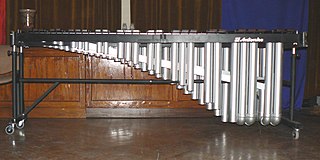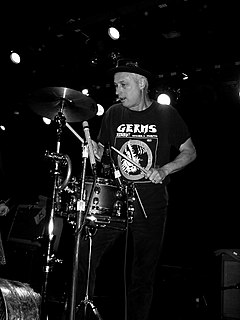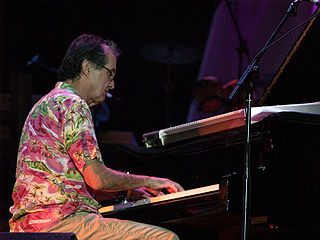
The marimba is a percussion instrument consisting of a set of wooden bars struck with yarn wrapped or rubber mallets to produce musical tones. Resonators or pipes are suspended underneath the bars to amplify the sound of the wooden bars. The bars of a chromatic marimba are arranged like the keys of a piano, with the groups of two and three accidentals raised vertically, overlapping the natural bars to aid the performer both visually and physically. This instrument is a type of idiophone, but with a more resonant and lower-pitched tessitura than the xylophone. A person who plays the marimba is called a marimbist or a marimba player.

Pierre Dewey LaFontaine Jr., known professionally as Pete Fountain, was an American jazz clarinetist.

Jeremy Webster "Fred" Frith is an English multi-instrumentalist, composer, and improvisor.

Music for 18 Musicians is a work of musical minimalism composed by Steve Reich during 1974–1976. Its world premiere was on April 24, 1976, at The Town Hall in New York City. Following this, a recording of the piece was released by ECM New Series in 1978.

Stephen Kendall Gadd is an American drummer, percussionist, and session musician. Gadd is one of the best-known and highly regarded session and studio drummers in the industry, recognized by his induction into the Modern Drummer Hall of Fame in 1984. Gadd's performances on Paul Simon's "50 Ways to Leave Your Lover" and "Late in the Evening" and Steely Dan's "Aja" are examples of his style. He has worked with popular musicians from many genres including Simon & Garfunkel, Steely Dan, James Taylor, Harry Chapin, Joe Cocker, Grover Washington Jr., Chick Corea, Lee Ritenour, Paul Desmond, Kate Bush, Chet Baker, Al Di Meola, Chuck Mangione, Kenny Loggins, Eric Clapton, Michel Petrucciani, and Toshiki Kadomatsu.

John Morgan Roderick is an American musician, singer, songwriter, podcaster, and politician. He is the lead singer and guitarist of the rock band The Long Winters, was a touring member of the rock band Harvey Danger, and co-hosts the podcasts Roderick On The Line, Road Work, and Omnibus.

Jerry Miller is an American songwriter, guitarist and vocalist. He performs as a solo artist and as a member of the Jerry Miller Band. He is also a founding member of the 1960s San Francisco band Moby Grape, which continues to perform occasionally. Rolling Stone included Miller at number 68 on their list of the 100 greatest guitarists of all time and Moby Grape's album Moby Grape at number 124 on their list of the 500 greatest albums of all time. Miller's longtime guitar is a Gibson L-5 CES Florentine guitar which he calls "Beulah".

Donald J. Bonebrake is an American musician from California who first emerged as the drummer of the punk rock band the Eyes. He is best known as an original member of and drummer for punk band X, of which he is still an active member.
Robert Havens is an American big band and jazz musician who appeared on The Lawrence Welk Show from 1960 to 1982. His instrument is the trombone.

Don Grusin is an American jazz keyboardist, composer, and record producer. He is the younger brother of Dave Grusin.
William Overton Smith was an American clarinetist and composer. He worked extensively in modern classical music, Third Stream and jazz, and was perhaps best known for having played with pianist Dave Brubeck intermittently from the 1940s to the early 2000s. Smith frequently recorded jazz under the name Bill Smith, but his classical compositions are credited under the name William O. Smith.

Diane Joan Schuur, nicknamed "Deedles", is an American jazz singer and pianist. As of 2015, Schuur had released 23 albums, and had extended her jazz repertoire to include essences of Latin, gospel, pop and country music. Her most successful album is Diane Schuur & the Count Basie Orchestra, which remained number one on the Billboard Jazz Charts for 33 weeks. She won Grammy Awards for best female jazz vocal performance in both 1986 and 1987 and has had three other Grammy nominations.
Emil Richards was an American vibraphonist and percussionist.
The Baja Marimba Band was a musical group led by marimba player Julius Wechter. Formed by producer Herb Alpert after his own Tijuana Brass, the Baja Marimba Band outlasted the Tijuana Brass by several years in part due to TV producer Chuck Barris, who included the group's music on his game shows in the 1970s.

Nelson Rangell is an American smooth jazz musician and composer from Castle Rock, Colorado. Although he is known for his work with the tenor, alto, and soprano saxophone, his primary instrument is the piccolo, which he began playing at the age of 15. He has at times worked with Jimmy Haslip and Russ Ferrante.

"Rikki Don't Lose That Number" is a single released in 1974 by rock/jazz rock group Steely Dan and the opening track of their third album Pretzel Logic. It was the most successful single of the group's career, peaking at number 4 on the Billboard Hot 100 in the summer of 1974.

William Keith Pitman is an American guitarist and session musician.

Michael Waldrop is an American drummer, percussionist, composer and music educator. He is notable as a virtuoso percussionist in both jazz and classical idioms; with equal focus on drumset and keyboard percussion (marimba/vibraphone). Since 2014 he has been a recording artist for Origin Records.

Origin Suite is the second jazz album by Michael Waldrop, produced by award-winning Seattle, Washington-based label Origin Records and released January 3, 2018. The CD idea is a high level, eclectic mix of works showcasing Michael Waldrop. Specifically, the Origin Suite was composed for this CD as a tour de force to showcase Waldrop. Most notably the CD received 4 of 5 stars by music critic and author Brian Morton in the April 2018 edition of Jazz Journal from London.














